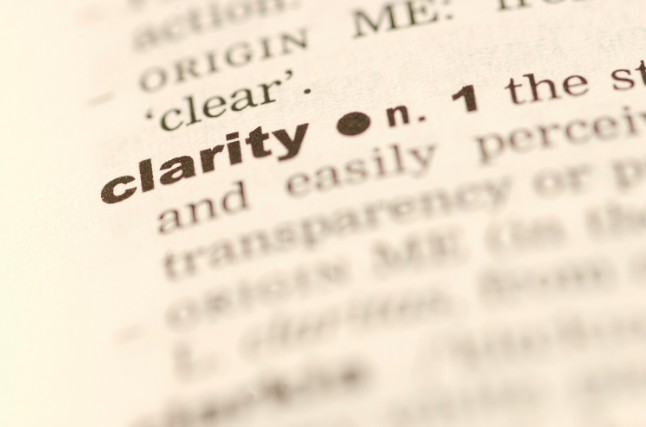
Effective communication is key in getting our point across regardless if we are writing to entertain, to communicate with clients, or to meet the requirements of university graduation. When communication is effective, the writer’s intentions are clear.
Here are some unclear writing examples with suggestions for improving clarity.
Clarity in Fiction
Clarity in fiction is important so readers can follow your story and continue reading. If sentences are confusing, they will find another book to read. Consider the use of adverbs in this sentence:
- It rolled slowly away from him to dully clatter down the bank of the pebbled shore.
This sentence is a bit of a mouthful and can be clearer by substituting more concise verbs, eliminating the use of adverbs. Instead of rolled slowly, I can use trickled. The phrase dully clatter seems contradictory, so why not one word that makes its meaning clear?
- It trickled away from him, spattering down the bank of the pebbled shore.
The second sentence describes the scene using fewer words and more accurate verbs, allowing the reader to stay engaged in the story rather than either re-reading the sentence or closing the book and moving on to another one.
Clarity in Business
More and more, the corporate world is turning away from its traditional legalese style of communicating. Legalese has its place, but the use of legal terms and long explanations in a presentation can cause people’s eyes to glaze over before you get to your point. The consequences of poor writing in business can be detrimental. Bad spelling and grammar can cost sales and hurt your brand.
I read this on a bookkeeping company’s homepage: “You talk to us about your business and we exchange ideas.” This statement is vague. It doesn’t tell me anything about what the company does, so I don’t know how they can help me. Although this sentence is short and to the point, it’s not clear.
An improved statement is: “We help you tame your mountain of paperwork so you can carry on with the graphic design work you enjoy.” While this sentence is much longer, it’s also clearer. It tells me that this bookkeeping company will record my business transactions for me and they work with graphic designers.
Clarity in Education
I was looking for a good radio station while driving and came across an announcer who was planning to explain where the tradition of Christmas trees comes from. I paused on the station because this sounded interesting and I’d never heard why we have Christmas trees today. He dove into a long explanation about the British Royals and how before World War I, their name was German then said, “We got the Christmas tree from the Germans.” But he never answered the question of how the Christmas tree tradition came to be.
While this isn't a written example, this announcer reminded me of how I used to write essay questions on exams when I had no clue what to write about. I would ramble on, listing as many unrelated points about the topic I could think of, hoping I might get a few marks for effort.
When you’re teaching or explaining something, always consider your audience and the main point you want them to get out of your lesson. Your point is best emphasized with short and clear sentences. State your point, explain it, then state it again in your summary.

How You Can Improve the Clarity of Your Writing?
Improving the clarity of your writing is easy with ProWritingAid’s reports. There are a few I use regularly.
Reduce Sticky Sentences
One of my favourite ProWritingAid tools is the Sticky Sentences Report. My writing always sounds better after I run the report and make the recommended corrections.
The Sticky Sentences Report identifies "glue words". Glue words are the words that hold sentences together, but when you have too many in a sentence, it becomes hard to read. By removing unnecessary glue words, your sentence becomes clearer.
The Sticky Sentences Report highlights sticky sentences and also identifies the glue words in sentences so you know which words to change or remove to improve your sentences.
Remove Unnecessary Words
Another report that can help you remove unnecessary words is the Grammar Report. There are lots of words that don’t improve your writing and other words that can be eliminated to make your sentences more precise. For example, while writing this article, I used “more clear” and the Grammar Report suggested “clearer” instead.
Other common unnecessary words include:
- really
- just
- very
- actually
- in order to
- definitely
- absolutely
Avoid Clichés
Clichés are expressions that have been around forever. Phrases like actions speak louder than words, love is blind, and the grass is always greener on the other side. Even though these expressions are older than dirt, when isolated, they aren’t clear. Your audience might not know what it means when you write “the grass is always greener on the other side.”
The Clichés and Redundancies Report highlights these phrases so you can brainstorm new and better ways to say the same thing.
Check Your Style
The Writing Style Report checks several areas of your writing to help improve clarity including passive voice, adverb use, and choosing the right verb. There are few types of writing where passive voice has its place—active verbs are better. Academic writing where pronouns are discouraged often end up containing passive verbs because the sentence starts with an object rather than a noun or pronoun.
Here’s an example of passive voice:
The sample was selected.
And the same sentence using an active verb:
Researchers selected the sample.
Circling back to the Clarity in Fiction example above, the Writing Style Report can help eliminate adverbs by suggesting more appropriate verbs. This is one of my favorite tools, because I rely on the same boring verbs.
If this all sounds overwhelming, don't worry, the ProWritingAid reports are quick to run and easy to follow. You can find more information about using all the ProWritingAid reports on our blog.

